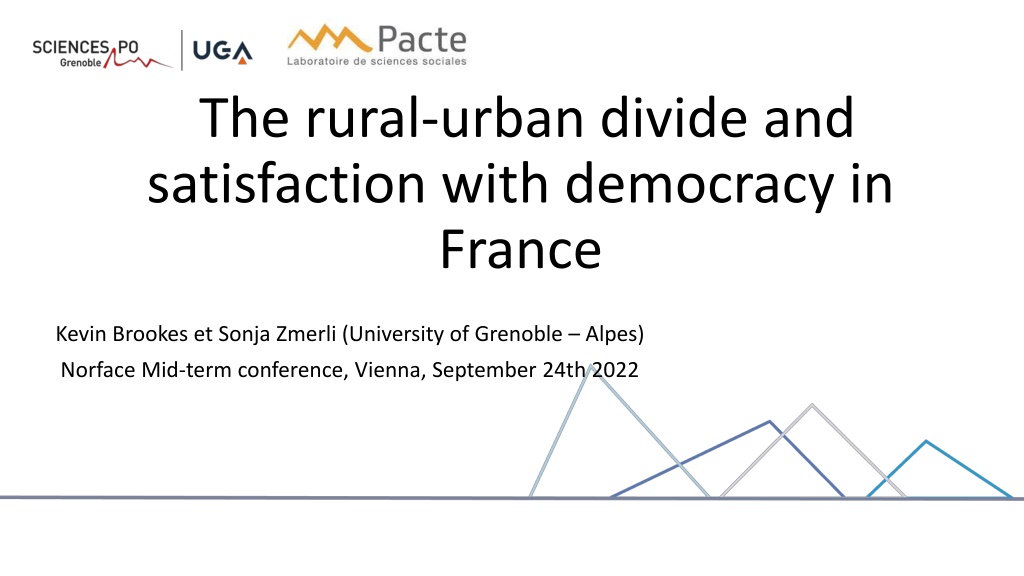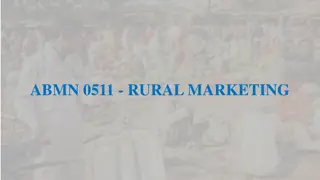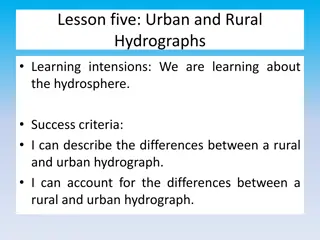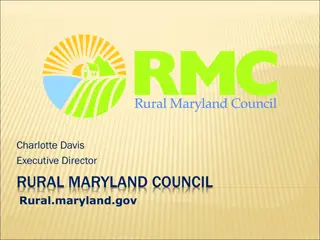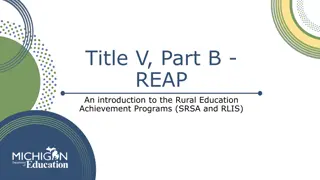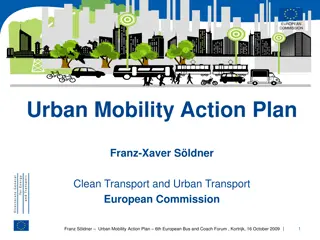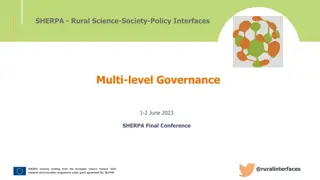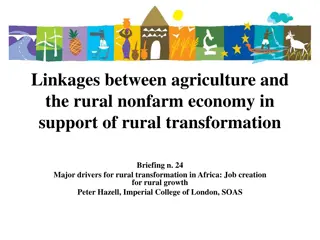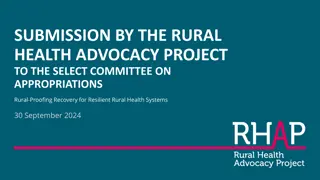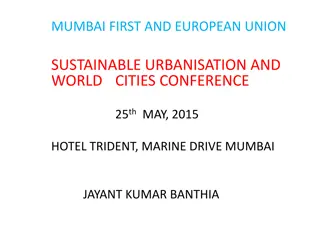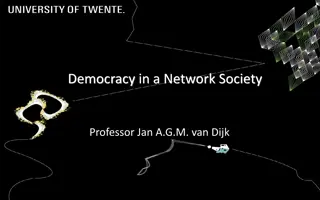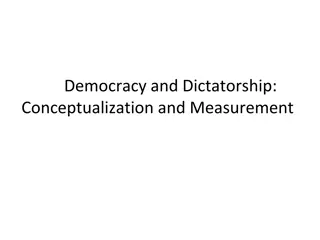The Rural-Urban Divide and Satisfaction with Democracy in France
This study delves into the rural-urban dynamics in France concerning satisfaction with democracy. It explores how place of residence influences political attitudes, particularly focusing on the discontent among rural dwellers. By examining various factors such as economic values, media discourse, and the gap in democratic satisfaction between urban and rural areas, the research aims to unravel the complexities behind this divide.
Download Presentation

Please find below an Image/Link to download the presentation.
The content on the website is provided AS IS for your information and personal use only. It may not be sold, licensed, or shared on other websites without obtaining consent from the author. Download presentation by click this link. If you encounter any issues during the download, it is possible that the publisher has removed the file from their server.
E N D
Presentation Transcript
The rural-urban divide and satisfaction with democracy in France Kevin Brookes et Sonja Zmerli (University of Grenoble Alpes) Norface Mid-term conference, Vienna, September 24th 2022
Plan of the presentation 1) Background on the French case 2) Research design 3) ESS Data: rural / urban divide on satisfaction with democracy 4) Descriptive statistics: a place based ressentment of rural dwellers 5) Place of living, resentment and satisfaction with democracy
Background on the French Case Rural / urban divide in terms of electoral behaviour pointed out since the 2000 s. Mediatic discourse about a so called France p riph rique , economically left behind (Christophe Guilly 2014) There is no clear rural / urban difference in terms of economic values, but there is some about political values and satisfaction with democracy. The place of living seems a weaker predictor than income on these values (Br chon 2019) Media discourse recently emphased the rural / urban dimension in the vote for the French presidential election (Fourquet 2022)
A French specificity? Traunm eller et al. 2021: rural dwellers are less satisfied with democracy than rural dwellers in most countries of Europe. The gap is wider in France than elsewhere ; compositional effect is rather weak (25% of the variation), other explanations are important Place of living and satisfaction with democracy, France, ESS waves (1-10) ESS Data : Satisfaction with democracy low in France (4.6 on all waves) and slightly decreasing since wave 7 As shown in this graph the gap between urban and other kind of dwellers is significant since the end of the 2000 s and seems to increase over time (controlling for socio- demographic variables)
Research questions and hypothesis Research questions Is there a rural / urban divide in France regarding satisfaction with democracy? If it exists, what are the reasons that could explain it? Competing explanations in the litterature to explain the relationship between place of living and political attitude Composition effect (Rivi re 2017 ; 2008) Economic and social decline in peri-urbanity and rurality (Guilly 2014) Sorting effect (L vy 2003) Blindspot: contextual effects (resentment, social contact, Hypothesis Place of living has an independent effect on satisfaction with democracy: rural dwellers being less satisfied than urban dwellers Interaction effect of place of living with ressentment predicts satisfaction with democracy
Data collection for the RUDE project in France Pre-test survey conducted for the RUDE project on approximately 650 respondents via the Lime Survey platform in February 2022 Relatively small sample and imperfectly representative of the population (younger and more educated than the average population) Questionnaire of 17 minutes (average) with the following themes: place of living, place based consciousness, resentments, political issues, mobility, socio-demographics Measure of satisfaction with democracy: On the whole, how satisfied are you with the way democracy works in France Different measures of place of living: self-identification that could give different results (Trujillo 2020), objective place of living (Degurba), self declaration (ESS) Consciousness: measured by battery of items
Place based consciousness in France Rural people identify more with the people who live in their area than other subgroups Sense of belonging is strong (somewhat agree/strongly agree) Peri-urban and urban dwellers have the same level of sense of belonging to a place of life, lower than rural dwellers
Significant difference in the level of resentment towards political power between sub-groups (1 point difference between rural and urban) In concrete terms, a fairly strong feeling among rural people that they are not represented enough in the media and in parliament, that political leaders ignore the issues that matter to them and that they have no say in what the government does Resentment - political power
Statistically significant and large difference between the three groups on resentment of the distribution of resources between the three areas Rural people feel they are the last to benefit from public spending and do not receive their fair share of investment Resentment economic ressource
Resentment way of life Significant difference in level of resentment about the way of life. Rural people feel they work more than people from other areas and they have have different values to urban people
Different mental schemes to represent people living in the same place of living and others Questions Rurals Peri-urbans Urbans If you were to imagine people with similar lifestyles and opinions to you, what kind of people would they be? How would you describe them? "Simple people who like nature and peace and quiet, animals and working the land, spending time outside and observing nature. "Executive 35-40 years old, parents of 2-3 children, wishing to own their own home and enjoy the advantages of both a big city and the countryside. "DYNAMIC and curious to discover new things". "civilized person living in the city". "People who live in the countryside, by choice, to have a better quality of life. "Active people who do not want to live in the country or in the city, but who want to have all the infrastructures at their disposal". What about a person who is not at all like you and who does not have the same opinions? How would you describe them? "It would be a person living in the city who is praising renewable energy even though wind turbines do not impact on their living space and they do not need a vehicle to get around as they have everything at their fingertips. "People who have never seen a cow and a pig "People from big cities like PARIS for example". "Closed, homebound people". "Closed-minded people". "A person who doesn't take the time to live and who is always in a hurry, in short a person who is not very happy "Uncivilised people". " Lack of culture or uneducated " " They are simply people living in rural areas "
Place of living, resentments and satisfaction to democracy Statistical method: ordinary least square regression taking into account control variables such as education, age, gender, income level Comparison of the effect of several measures of location (subjective/objective), belonging, different types of resentment, on the level of satisfaction with democracy
Self-identification with a place to live does not seem to have an effect on the level of satisfaction with democracy, but the declared place to live does: living in the countryside reduces the level of satisfaction with democracy The higher the different types of resentment among individuals, the less satisfied they are with democracy (especially the one about respect for the way of life)
the level of resentment has an moderating effect on the place of living in its association with satisfaction with democracy resentment towards resources, towards respect for the way of life, and towards political power has a negative effect on the level of satisfaction with democracy in peri-urban and rural areas, but not in cities
Conclusion Place based consciousness is higher among rurals There is a higher levels of resentment related to ressources, political power, and way of life among rural dwellers Lower level of satisfaction with democracy among rural people, controling for socio-demographic variables Different types of resentment have a negative effect on the level of satisfaction with democracy (except for urban people) Our (expected) contributions : methodological and theoretical
